Michele Huey's Blog: God, Me, and a Cup of Tea, page 17
December 11, 2021
Advent 3: What Happened to Your Joy?

What has happened to all your joy? – Galatians 4:15 (NIV)
When we moved from town to the country 40 years ago, we planted three kinds of fruit trees. I had visions of homegrown apples in bowls on the counter and sparkling jars of fresh canned peaches and pears.
For the most part, though, the vision remained just a dream. The apple trees never bore fruit, never grew more than three feet high, thanks to the deer. The peach tree produced luscious peaches for a few years then shriveled up and died.
The only fruit trees remaining are two pear trees. One is dwarfed—I think because my son shot an arrow through it when it was still quite young. The other is leafy and laden with fruit come late summer, but the pears are small, misshapen and marked with black dimples.
To produce more and better fruit, the trees need cultivated and nurtured. The problem is we don’t have a clue. Or maybe it’s because we haven’t made the trees a priority. Until we get serious about those trees, until we take the time to learn how to care for them and then do it, the trees will struggle along, producing little usable fruit.
I tell you this story because, like fruit trees, the fruit of the Spirit also needs to be cultivated and nurtured.
Take joy, for example.
If there is anything missing from society today, it’s joy. Just look at the faces of people you see every day. Even believers, who should be oozing joy, are not. Joy should set us apart right off the bat.
Do you remember the joy you had at salvation? Overflowing, spilling out, you couldn’t contain it. Then little by little, life robbed you of that joy.
Life is going to happen. Although we can’t control it, we can control our reaction to it. We can choose joy. We can make it a priority and nurture it.
How?
First, be aware of the joy stealers that chomp away at it or shoot it right in the heart. “If a homeowner knew exactly when a burglar was coming, he would not permit his house to be broken into” (Luke 12:39 NLT). Know the burglars will come. Don’t let them in.
Forgetfulness is one of those burglars. Stuck in the mire of this earthly life, we forget our past and our future: from what we’ve been saved and what awaits us in heaven.
Legalism is another joy stealer. Religion—all that we do to try and earn heaven (which can’t be earned—see Ephesians 2:8–9) binds us. Relationship—our personal relationship with God through His Son—frees us.
Unconfessed sin, disobedience, worry, anger, people and life are other joy stealers.
Being aware of these thieves will make you more alert when they try to rob you. And when they do, don’t let them in.
How can you replace the joy you’ve lost?
Simple: Ask the joy-giver—God Himself—to fill you with His joy and help you to sustain it. Seek His presence (“In your presence is fullness of joy.” – Psalm 16:10).
Choose joy. Nurture and cultivate it. Then spread it around, letting it overflow, spilling over onto those around you.
As we light the third candle on the Advent wreath — the pink one, which represents joy—may we remember that the joy of the Lord is our strength (Nehemiah 8:10). Amen.
Read and reflect on Galatians 5:22–23.
© 2015 Michele Huey. All rights reserved.
***
STILL LOOKING FOR JUST THE RIGHT GIFT?
Why not give a gift that keeps on giving, all through the year?
Check out my devotional book series GOD, ME, AND A CUP OF TEA.
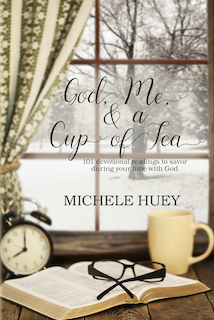 God, Me, and a Cup of Tea: 101 devotional readings to savor during your time with God
God, Me, and a Cup of Tea: 101 devotional readings to savor during your time with God
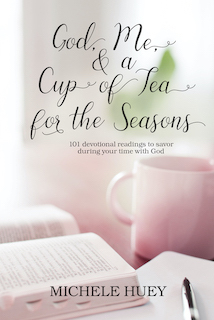 God, Me, and a Cup of Tea for the Seasons
God, Me, and a Cup of Tea for the Seasons
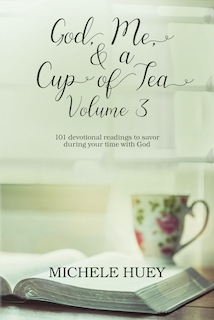
December 4, 2021
The Christmas Light

The people living in darkness have seen a great light. – Matthew 4:16 (NIV)
In 1986, Frank Peretti’s This Present Darkness shot to the top of the bestseller list and stayed there for nearly three years. Based on Ephesians 6:12, the book addressed spiritual warfare: “For we do not wrestle against flesh and blood, but against the rulers, against the authorities, against the cosmic powers over this present darkness, against the spiritual forces of evil in the heavenly places” (ESV).
In 1995 Left Behind, a novel about end times based on Scripture, was released. Three years later, the first four of what would be a 16-book series held the top four spots on the New York Times bestseller list simultaneously. By the time the final book of the series was published in 2007, the media looked to authors Jerry Jenkins and Tim LaHaye as end times experts.
I’ve been thinking a lot about darkness and end times lately. And not only because we’re right smack dab in the middle of the darkest part of the year or because I’ve recently read Where Do We Go From Here? How Tomorrow’s Prophecies Foreshadow Today’s Problems by Dr. David Jeremiah.
While I don’t see the devil behind every tree, I do believe in spiritual warfare and believe it has been increasing. While I leave the future (and the present) in God’s hands and believe only He understands fully the prophecy about the Antichrist, I see an anti-Christ spirit growing at an alarming rate. The world is getting darker and darker.
But the world was a dark place 2,000 years ago when God sent the first Christmas Light. Born during a time when the Jews were subject to (and persecuted by) a tyrannical Roman government, God’s Son was born in a stable and laid in a manger. Mary and Joseph had to take Him and flee to Egypt because a crazy, jealous king ordered hundreds of baby boys murdered to eliminate any competition to his throne. A little over three decades later, after spending three years doing good, He was deserted by those closest to Him, rejected by the nation He came to save, and executed on trumped up charges.

But “in Him was life, and that life was the light of men. The light shines in the darkness, and the darkness has not understood it (can never extinguish it)” (John 1:5).
Jesus was the first Christmas light, and He still shines today, giving us hope for a better future when He returns:
“Then I saw a new heaven and a new earth . . . I saw the Holy City, the new Jerusalem, coming down out of heaven from God . . . God himself will be with them and be their God. He will wipe every tear from their eyes. There will be no more death or mourning or crying or pain. . . . There will be no more night . . . for the Lord God will give them light” (Revelation 21:1–22:5).
So don’t despair when you hear the latest news. Let the Christmas lights remind you of the hope that is yours through faith in the Baby whose birth those lights celebrate.
Let the Christmas lights shine brighter than the darkest news headlines, and remind me of the Light of the World, to whom every knee will bow and every tongue confess that He alone is Lord! Amen.
Read and reflect on Isaiah 9:2–7.
© 2012 Michele Huey. All rights reserved. Used with permission.
November 27, 2021
1st Sunday of Advent – Expectations
She gave birth to her firstborn . . . and placed him in a manger, because there was no room for them at the inn. – Luke 2:7 (NIV)
My husband’s a hard worker, so I try to ease the workload around the house when I can. Sometimes, though, my efforts make more work than if I’d just let him do the job in the first place.
Wanting to surprise him, one year I decorated the front deck with pine garland and white Christmas lights. That was the first year we had a deck to decorate, and the coffers had taken a hit with building front and back decks that summer and re-roofing the house. So the least expensive garland and light string I could find, I got.
I wanted him to come home from work and “ooh” and “ahh” over how it looked or at least show appreciation. Instead he said nothing. When my husband says nothing in a situation like this, I assume he doesn’t like it and he doesn’t want to say anything because it’ll just get him in trouble. Which it did. Because I squeezed the truth out of him—so I really shouldn’t have been mad, right?
After a couple of days, I broached the subject, and we discussed how the front deck decorations could be improved. I do admit, he’s a much better decorator than I am. He has both the eye and the touch. My decorating philosophy is the same as my baking philosophy: throw it together and hope it turns out right.
“It’s not that I don’t like it,” he told me. “It’s just not what I expected.”
Expectations—that’s what this was all about, not who was right and who was wrong. I expected him to lavish praise on my efforts and was disappointed when he didn’t. He expected thicker boughs, something that stood out more, and was disappointed when the reality didn’t match the vision. Once we talked about it, the air cleared.
Expectations weren’t met when Jesus came, either. He was born not at home, but in a town 70 miles away, in a stable because the inns were full of travelers coming to pay their taxes. No family gathered around the new parents to rejoice with them, only strange shepherds and even stranger foreign dignitaries. And when He grew up, Jesus didn’t fulfill the expectations of anyone but His Heavenly Father. Even His death caused crushing disappointment for all who expected something different. But the reality was so much more than they ever could have dreamed!
Be careful of expectations. They can be good, but they can also be dangerous.
When we expect something of ourselves, our expectations can drive us to be better persons. But when we expect something of someone else, expectations can be dangerous because we’re so focused on what we expect—what we want—that we’re blind to the reality in front of us.
And sometimes, like with the birth, life, and death of Jesus, the reality is so much better than the expectation.
When things don’t turn out the way I expect, Lord, remind me that in Your hands the reality is exceedingly abundantly above all I could have asked for or imagined (Ephesians 3:20). Help me to live in such a way that I meet Your expectations of me. Amen.
Read and reflect on Luke 1:26–38.
© 2012 Michele Huey. All rights reserved.
November 25, 2021
Looking for a gift idea?
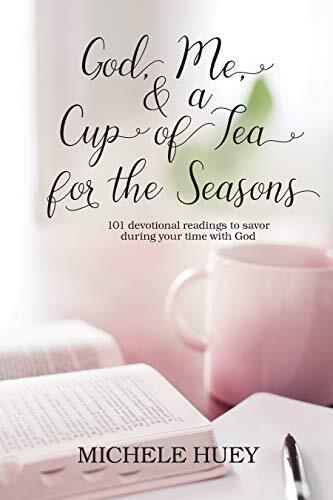
The words of the song “Sunrise, Sunset” from “Fiddler on the Roof” have long resonated within my soul. Indeed one season follows another in the story of our lives, bringing challenges, disappointments, and heartaches, but not without splashes of hope and sprinklings of happiness. This collection of devotional readings, an excellent resource for holiday programs and publications, gives fresh meaning to the seasons and holidays of the year. So pour yourself a cup of tea, grab your Bible, and head for your comfy chair to savor a cup of inspiration, a spoonful of encouragement, and a generous outpouring of the milk of God’s love. SELAH!
Available in Kindle and print editions. Click here to order.
November 20, 2021
Thanksgiving Thoughts
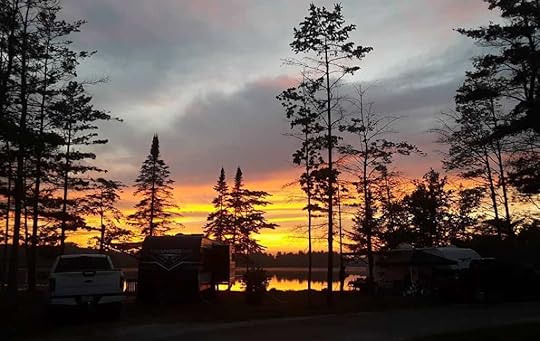 Sunset over Thunder Bay River/Lake Wynah, Alpena, Michigan, August 18, 2021
Sunset over Thunder Bay River/Lake Wynah, Alpena, Michigan, August 18, 2021For the LORD is good and his love endures forever; his faithfulness continues through all generations. – Psalm 100:5 (NIV)
God has given me many gifts. In this season of Thanksgiving, I’m going to dwell on three of them: the past, the present, and the future.
I’m thankful for my past, especially that I grew up in a home where I witnessed my mother talking to God all day long. “Don’t You let it rain,” she’d say when she hung the laundry on the line. I’m sure that’s why I still live with an awareness of God’s abiding presence moment by moment.
“Where can I go from your Spirit? Where can I flee from your presence? If I go up to the heavens, you are there; if I make my bed in the depths, you are there. If I rise on the wings of the dawn, if I settle on the far side of the sea, even there your hand will guide me, your right hand will hold me fast” (Psalm 139:7–10 NIV).
Which brings me to the second gift for which I’m thankful: the present. For the freezer and panty shelves stocked with the vegetables we harvested from our garden. For the firewood stacked outside on the patio. For health and energy. For Friday night date nights with my husband. For our beautiful, fun grandchildren, who are growing up way too fast. For my husband’s part-time job that helps to make ends meet in our senior years. For opportunities to work out of my home doing what I love best. For the sunsets and sunrises and birds and trees and butterflies and all God created for our enjoyment and use. God’s abundant provision blows me away.
“Do not be anxious about anything, but in everything by prayer and petition, with thanksgiving, present your requests to God . . . And my God will meet all your needs according to his glorious riches . . .” (Philippians 4:6, 19 NIV).
Glory . . . that brings me to the third thing for which I’m thankful: the future.
There’s quite a bit of interest these days in end times. I’m not too worried about it. I don’t put a whole lot of stock in man’s predictions about end times. My Bible tells me only God knows when this will be. So why get all stressed about it?
“For I know the plans I have for you,” declares the LORD, “plans to prosper you and not to harm you, plans to give you hope and a future” (Jeremiah 29:11 NIV).
“The one thing I do, however, is to forget what is behind me and do my best to reach what is ahead. So I run straight toward the goal in order to win the prize, which is God’s call through Christ Jesus to the life above” (Philippians 3:13–14 TEV).
Past, present, future—my times are in His hand (Psalm 31:15).
Thank you, Lord, for Your abiding presence, abundant provision and awesome plan. Amen.
Read and reflect on Psalm 100, Joel 2:23–24, and Habakkuk 3:17–18.
November 13, 2021
The Best Gig
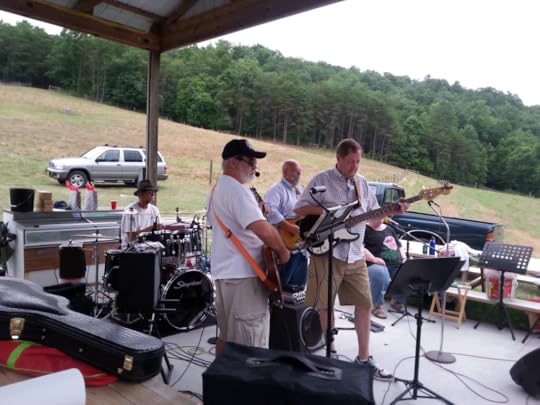 George (fourth from left) plays for a gig in July 2014. Photo courtesy of George Caylor.
George (fourth from left) plays for a gig in July 2014. Photo courtesy of George Caylor.Teach us to number our days, that we may gain a heart of wisdom. —Psalm 90:12 NIV
Music has been a part of my friend George Caylor’s life since he toured with a rock-and-roll band in the 1960s and early ’70s. At age 77, George still enjoys playing his bass guitar in an oldies band.
One day he and the band members visited their lead guitarist, Mark, who was in the home stretch of a terminal illness.
“We didn’t know that he would die the next day,” George told me. “We knew he was going to die, but we thought it might be in a month. We didn’t know. Nor did he.”
They got to talking about the best gig they ever played.
“It was that job that we did for those rich people, that served Oysters Rockefeller,” George said. “That was the most unbelievable delicious spread of food I’ve ever had.”
They laughed. “George, you would think about the food.”
“That gig down in Virginia Beach,” Randy said. “Remember the size of the crowd and the cheering? The money they paid us?”
Then Mark—who was going to die the next day—put in his two cents.
“Do you remember the gig we played at that little vineyard in the Blue Ridge Mountains? Remember how sweet the people were? And then at the end of the day, do you remember that spectacular sunset?”
“And I got to thinking,” George told me. “Was it the money? The crowds? The cheering? The food? Or was it the sweet people and the spectacular sunset that made the most impact on our lives?”
Too often we go through life trying to make a difference. We want our lives to count for something. So we spend our time on earth doing, doing, doing—all too often feeling like a hamster on an exercise wheel, going round and round but not getting anywhere. And wondering if, in the end, what we did mattered.
Or we spend our days getting all we can to make our lives easier, more enjoyable. Then one day we realize our homes and offices and vehicles are cluttered with stuff we thought we needed. So we rent storage space to put all that extra stuff we don’t need but we don’t want to part with.
Our sentiments echo those of the writer of Ecclesiastes, who pursued work, pleasure, wisdom, knowledge—in short, everything under the sun. Only to discover, in the end, it all was meaningless—“a chasing after the wind.”
So what, then, gives our lives meaning and purpose?
The crowds? The applause? The money? The things we can get with money? The food?
Or the people we encounter? The spectacular sunsets. Autumn in all its glowing glory. A soft snowfall. The first flower of spring. The smell of freshly mowed grass on a summer’s day. The scent of a freshly bathed baby. The feel of a child’s arms around your neck. The sense of your spouse’s presence next to you when you wake up in the middle of the night. The explosion of flavor from the first tomato of the season. The roiling black clouds of a coming storm. Or the white cotton ball clouds that change shape as they float through the summer sky. Cloud shadows skimming across a field. The gurgle of a mountain stream. The whirr of a hummingbird’s wings.
I don’t want to look back on my life and realize I missed all that really mattered. All that God placed within my reach but I didn’t touch, taste, see, smell, listen to, enjoy. Everything that cost absolutely nothing but the time to took to stop and savor it.
What about you? What is the best gig you ever played?
Help me, O Lord, not to chase after the wind but to spend my days with my eyes and heart wide open, ready to recognize and embrace the simple pleasures You bless me with every day. Amen.
Read and reflect on Psalm 90.
From God, Me, & a Cup of Tea: 101 devotional readings to savor during your time with God © 2017 Michele Huey. All rights reserved.
November 6, 2021
On Disappointment and Hope
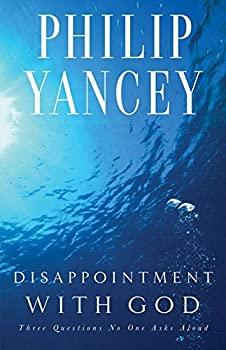
And hope does not disappoint us . . . – Romans 5:5 (NIV)
In his book Disappointment with God Philip Yancey tells the story of two men: a young seminary student named Richard who burns his Bible, his textbooks and all his Christian books after an intense struggle with disappointment; and Douglas, a psychologist who turned down a lucrative career to launch an urban ministry and faced a life of trial after his wife was diagnosed with cancer and a car accident left him nearly blind. I bought this book more than 20 years ago in an out-of-the-way bookstore while on a visit to my brother during a time when I, too, was struggling with disappointment. It was probably the lowest time in my life, when the future was a big question mark and everything that meant anything to me, from faith to family to career, seemed to be slipping away. A time when God was silent and I wondered if He even cared to stop my fall into a hole that seemed to have no bottom.
On that getaway trip, though, God was so real that everything I touched, read and experienced had GOD written all over it—including Yancey’s book. Because the disappointment I was feeling was bitter, deep, painful and hope-sucking, that book was a lifeline.
A dozen years later, I endured another period during which God was silent, the questions were plenty, the problems were getting deeper, and no answers were on the horizon. I prayed to get perspective, but I remained in a fogbank. Once again, disappointment tainted my days.
But I wasn’t having a crisis of faith. My faith was sure, firm—then and now. It’s my backstop against the wild pitches life hurls at me.
What I experience during these times is a crisis of hope. I don’t want to hope. I don’t trust it. Hope leads to disappointment. Wouldn’t it be better, I reason, to hope for nothing, expect nothing, and deal with whatever comes when it comes, whether it’s a delightful surprise or a discouraging setback?
Perhaps I hope too much, put too much stock in the future, in plans and dreams. Maybe I haven’t really learned to live. Perhaps life is like going on a trip, with the destination known but the route and the time it takes unknown – watching the scenery, enjoying the detours, stopping at a scenic overlook or buying fresh fruit from a roadside vendor; not being concerned about the gas mileage, whether or not I’m making good time, where I’ll stay the night, what I’ll eat, or how much cash I have left in my wallet.
Just lifting each moment as it comes and holding it close to my heart, gently pressing out the love and joy.
As I reread the story of Richard, I thought, “How sad! He didn’t give it enough time.” After years of professing Christianity and experiencing one bitter disappointment after another, he spent a night in prayer, asking God to reveal Himself. When morning came and heaven was still silent, he burned his faith.
Douglas, on the other hand, responded to his crises in a most unexpected way.
“To tell you the truth,” he told Yancey, “I didn’t feel any disappointment with God.”
What? He didn’t blame God or feel betrayed after being obedient and giving up money for ministry, only to have his wife get cancer and a drunk driver ruin his health? Wasn’t disappointed that God didn’t stop it or at least protect them?
“I learned,” Douglas explained, “not to confuse God with life. . . .We tend to think, ‘Life should be fair because God is fair.’ But God is not life. And if I confuse God with the physical reality of life—by expecting constant good health, for example—then I set myself up for a crashing disappointment.”
So where is hope in all this—in the unfairness and disappointments of life?
Perhaps, like faith and trust, hope is a choice.
Will I be a Richard or a Douglas?
Dear God, when disappointment dries up my dreams, give me the hope I need to plant new ones. Amen.
Read and reflect on Psalm 42.
From God, Me, & a Cup of Tea: 101 devotional readings to savor during your time with God © 2017 Michele Huey. All rights reserved. Used with permission.
October 30, 2021
Praying Out of the Box
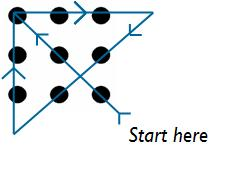
PRAYING OUT OF THE BOX
Now to Him who is able to do exceedingly abundantly above all that we ask or think, according to the power that works in us. – Ephesians 3:20 NKJV
There’s a scene in the movie Apollo 13 in which a group of space engineers are presented with an impossible problem and challenged to come up with a solution. Three astronauts’ lives depended on it.
Random spacecraft parts, seemingly meaningless to their objective of safely bringing home a severely damaged spacecraft, were dumped on the table in front of them. “This is what you have to work with,” they were told.
And they did it. But they had to think out of the box. They had to think beyond the scope of the normal, of what they knew and had experienced.
The phrase, “out of the box,” originated with a British mathematician who developed a nine-dot puzzle. All nine dots, on a three-by-three grid, must be connected with four straight lines—without the pencil leaving the paper.
The only way to do this is to extend the lines beyond the perceived boundary of the dots on the grid. I say “perceived” because we tend to see, or perceive, the outer row of dots as a boundary and the dots all lined up neatly “in a box.”
Only when you think “out of the box” and draw the lines beyond the imaginary boundary can you solve the puzzle.
But we feel safe in our boxes, don’t we? They’re what we’re familiar with, what we understand and can deal with.
Our boxes, however, limit us in many ways.
Take prayer, for instance.
How often do we pray “safe” prayers—prayers we feel comfortable praying because we’re not asking the Almighty to do the impossible? We’re not risking our faith and our Christian reputation on miracles we doubt will happen.
Well, the impossible is the Almighty’s specialty—and miracles are His delight.
The problem, my friend, is on our part—the doubt. Even a little, sniggly, wiggly, invisible-to-the-eye doubt that convinces us “this can’t be done.”
Of course it can’t be done—in human terms and in human (translate: possible) ways. That’s why we ask God to do it.
But too often we ask with doubt. Read the Gospels. See what Jesus had to say about doubt.
And I’m not saying that if you don’t have enough faith, your prayers won’t be answered.
What I am saying is that we need to pray out of the box—for the impossible, for the miracle. In other words, ask God to do His thing.
When a man in my church was experiencing serious health issues, we prayed over him as a congregation and anointed him with oil (see James 5:14).
I was surprised a few weeks later when he reported that doctors couldn’t find what they’d thought was a growth in his colon. What had been seen during medical tests was no longer there. They had no explanation for it, except divine intervention.
Why was I surprised? Doesn’t God like to answer “exceedingly abundantly above all we can ask or think”?
YES!
“According to the power”—His power—the power of growing faith—“that works within us.”
Have an impossible situation? Go ahead—pray out of the box. And watch El Shaddai do the impossible.
Praying out of the box stretches my faith, O Lord. Like a little used muscle, my faith needs to be stretched and exercised. Remind me that nothing is impossible for You and that You delight in answering in ways that are out of the box. Amen.
Read and reflect on Ephesians 3:14–21.
From God, Me, & a Cup of Tea: 101 devotional readings to savor during your time with God, © 2017 Michele Huey. All rights reserved.
October 23, 2021
Toilet Seats and Contentment

TOILET SEATS AND CONTENTMENT
It was good for me to be afflicted. —Psalm 119:71 NIV
Who would have ever thought purchasing a toilet seat would be the highlight of a shopping trip?
One year with escalating gas prices, a faltering economy, and a sharp drop in my freelance editing, my husband and I trimmed the budget and put into practice the two dozen ways to tighten our belts I had formulated.
During that year, I learned:
Wants are not needs. Like TV or satellite service. Like potato chips and ice cream. We not only saved the fifty dollars a month we were paying for the satellite service, we also shaved fifteen dollars a month from the electric bill by not turning on the TV as much. We watched DVDs on Friday and Saturday evenings and went to bed early, which also helped to save on the electric bill because we turned off the lights early. Unfortunately, cutting the potato chips and ice cream didn’t impact my weight loss hopes.
Living on less isn’t a hardship. It means less clutter, less stress, less money going out. Turning down the thermostat a couple of degrees, putting on a sweatshirt, and using a small heater in the room where I worked helped to save on the heating bill. I cancelled my gym membership. Walking and doing some old-fashioned exercises kept me in shape just as well as driving twelve miles to town to work out and cost nothing but time—much less time than it took to drive to town and back.
I really love gardening. Especially now that I’m freezing and canning for only two, not five. We expanded the garden, adding beans, squash, lettuce, and more tomato and pepper plants. I experienced once again the joy and satisfaction of seeing sparkling, colorful jars on my pantry shelves and stacks of vegetables in my freezer.
Staying focused on what we have—not on what we don’t have—increases the contentment level. “New” doesn’t always mean “better.” Throwing out something with years of good use left is wasteful and expensive, especially when that something is a vehicle. We ran our 1997 Explorer until we could afford to replace it. Sure, we had to get the transmission replaced and the alternator rebuilt, but that was a lot less expensive than a monthly loan payment.
The good life is really the simple life. Too often this truth gets buried under the advertisements bombarding us daily, under too much modern philosophy and not enough old-fashioned common sense. Making do with what you have until you can afford to replace it is simple common sense. So is using the cash you have, not the credit limit you have, to live on. I used a toilet seat with a broken hinge for months before replacing it. Hence the joy when I finally got a new one.
Blessings galore surround me, if only I open my eyes. For too long, the things I wanted but didn’t have blocked the view of the blessings.
Yes, affliction can be good. It brings us back to where we need to be: trusting in the grace and goodness of God.
But this I call to mind, and therefore I have hope: The steadfast love of the LORD never ceases, his mercies never come to an end; they are new every morning; great is thy faithfulness (Lamentations 3:21–23).
Read and reflect on Matthew 6:19–33.
From God, Me, & a Cup of Tea: 101 devotional readings to savor during your time with God, © 2017 Michele Huey. All rights reserved.
October 16, 2021
The Other Shoe
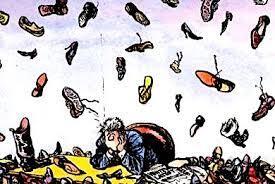
Awake, O Lord! Why do you sleep? –Psalm 44:23 NIV
A man checked into a hotel room and was told to be as quiet as possible because the guest in the next room was a light sleeper. As he pulled off his shoes, he accidentally dropped one on the floor, making a loud thunk! He carefully slipped off the other shoe and crawled into bed. An hour later, he was awakened by someone pounding on the wall and a shout from the light sleeper next door: “For heavens sake, drop the other shoe!”
Have you ever waited for the other shoe to drop? “Trouble comes in threes,” you’ve heard, and you’ve already been slammed with two. “What else could go wrong?” you ask, but don’t really want to know. So you spend your days and nights anxiously waiting for the other shoe to drop.
A Facebook friend, suffering from shingles and enduring cortisone shots, said that she “felt the question hovering over me, looking for a place to land.”
Been there? Done that? Haven’t we all.
In times like these, we wonder where God is. We’ve prayed and prayed and prayed, yet not even a whisper of an answer comes from heaven. Not even a “Wait.” God is silent, and we don’t know why.
Psalm 44 addresses this scenario. The psalmist goes from feeling blessed to abandoned, and he doesn’t think it’s fair.
While in the context of this psalm, he’s speaking for the nation of Israel, we, as individuals, can identify with the situation and his feelings: “You blessed us” (vv. 1–8). “You abandoned us” (vv. 9–16). “It isn’t fair because we didn’t do anything wrong” (vv. 17–22).
Like the psalmist, we have a choice. We can stay in our pit of self-pity, feeling betrayed, rejected, and abandoned, or we can accept God’s sovereignty and, like the psalmist, still pray, “Help me!” (vv. 23–26).
My Facebook friend chose not to wait for the other shoe to drop, but “to live by faith not fear.”
When read this psalm in my Quiet Time Bible one morning, I was challenged to “ask God to help you to understand His ways and grant you His peace when you are waiting for His voice.”
How can I ask Him for understanding, when my finite mind cannot wrap around God and His ways? As A. W. Tozer wrote, “God in His person and attributes fills heaven and earth exactly as the ocean fills a bucket which is submerged in its depths.”
But, even though I cannot even begin to understand—am I supposed to?—I trust that He has a plan and a purpose for my pain. I do not pray for patience as I wait for His answer. Instead, I pray for strength for the wait and His grace to sustain me as I wait.
He hears. He will answer. Of that I have no doubt—even when the other shoe drops.
In the morning, O Lord, You hear my voice. In the morning I lay my requests before You and wait in expectation (Psalm 5:3). Thank You for the hope I have in You. Blessed assurance! Amen.
Read and reflect on Psalm 44.
God, Me, and a Cup of Tea
- Michele Huey's profile
- 19 followers



